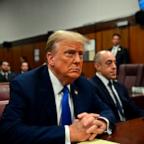Massive Rally in Venezuela Underscores Opposition's Electoral Strength
Henrique Capriles may Have a Real Shot at Defeating President Chavez
Oct. 1, 2012 — -- CARACAS -- On Sunday morning, rivers of people waving flags headed towards downtown Caracas, to see a speech by Venezuelan opposition candidate Henrique Capriles.
The 40-year-old state governor is attempting to defeat President Hugo Chávez in elections slated for October 7th. It's a tall order considering the Venezuelan president's spending power, and his popularity with the country's poor.
But it was easy to see people from all walks of life on Sunday. And the feeling that prevails amongst the people I spoke to there, is that this is the best chance the Venezuelan opposition has ever had to defeat Chávez. The socialist leader, who has held office for the past 14 years, has defeated his opponents by 15 to 20 percetage points in the past three presidential votes.
But with less than a week to go before elections Capriles leads Chávez by a small margin in surveys carried out by reputable pollsters such as Consultores 21. Capriles has also gained ground on the Venezuelan president in polls that give Chavez the lead.
"You have to recognize that Chávez reached people who had been given no importance by government before," said Marisol Fuentes a psychologist in her forties who attended Sunday's rally. "But what is regrettable is that he hasn't used his leadership, to turn Venezuela into an economic power," Fuentes added.
Venezuela is one of the world's largest oil producers, and 40 percent of the government budget comes from oil income. Throughout much of his time in office Chávez has benefited from high oil prices, and used the country's wealth, to invest heavily in social programs for the country's poor.
But the country suffers from high inflation rates, food shortages and low investment rates, that make it difficult for people to find jobs outside the government burocracy. Thousands of flood refugees wait in abandoned buidlings in Caracas, for the government to help them find a decent home.
Capriles says he wants to run Venezuela as a free market economy with strong social programs like Brazil.
During Sunday's speech, he chided Chávez for not fulfilling promises to build hospitals, schools and infrastructure projects, asking voters to evaluate if their quality of life had improved during Chávez's most recent six-year term.
Capriles spoke about the country's dramatic violence problem --- the homicide rate is two and a half times greater than in Mexico -- and also criticized the Venezuelan president for spending lavishly on foreign aid projects such as a refinery in Jamaica, and a soccer stadium in Bolivia, while Venezuelans are having trouble with power shortages and find it difficult to afford a home.
In the past, opposition candidates criticized Chávez for clamping down on freedom of speech by placing tougher regulations on the local media or for increasing his power in institutions like the judiciary or the state-owned oil company, PDVSA.
Political analyst Manuel Malaver argues that Capriles has been able to generate a buzz in this election campaign because he has placed greater emphasis on the daily problems that affect most Venezuelans.
"Capriles is very different from other opposition politicians," Malaver told Univision/ABC. "He realized that he could not connect with people by talking about abstract things like democracy."
During Sunday's speech Capriles also attempted to counter Chávez campaign discourse, in which the elections are sometimes described as a battle to save the government's socialist revolution, and the country itself, from right wing extremists backed by foreign powers.
"This is not about being from one ideology or another," Capriles told his supporters, who packed Caracas' Bolivar Avenue. "You know that the ideology here is progress, overcoming poverty, and investing the resources of Venezuelans right here, so that we can generate opportunities."




